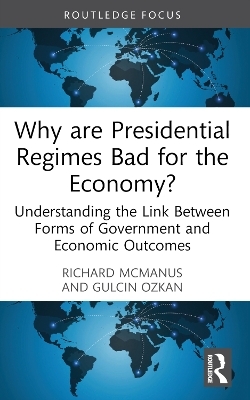
Why are Presidential Regimes Bad for the Economy?
Routledge (Verlag)
978-0-367-69287-2 (ISBN)
Recent evidence suggests that macroeconomic outcomes are inferior in countries operating under presidential regimes compared with those with parliaments, with lower levels of economic growth, higher rates of inflation, and higher levels of income inequality in countries with presidential governments. Despite this, more heads of state look to consolidate and build their executive power. This book considers why presidential regimes, in particular, are so bad for the economy.
Throughout the book, the authors comprehensively and simultaneously consider the impact of legal, political, and economic institutions on the mechanisms. It is first demonstrated that presidential countries have (on average) inferior outcomes relative to parliamentary states with respect to these institutions and, moreover, with respect to healthcare and human development indicators. Subsequently, the book explores the impact of constitutional choice (parliamentary versus presidential) on both institutions and macroeconomic outcomes. It is documented that having a presidential regime induces weaker institutions, but that quality institutions can mitigate some of the negative impacts of such regimes.
Dr Richard McManus is Director of Research Development at Christ Church Business School and is Reader in Macroeconomic Policy. His main research interests are in the area of the impact of government on macroeconomic outcomes. Gulcin Ozkan is Professor of Finance at King’s College, London. Her research focuses on the intersection of macroeconomics and finance covering issues such as financial crises, financial stability, monetary and macroprudential policies, emerging markets, public debt, fiscal policy, and financial constraints, and the economics of constitutions.
1. Introduction and overview 2. Constitutions, form of government, and macroeconomic outcomes 3. Forms of government and political, legal, and economic institutions 4. How do constitutions influence macroeconomic outcomes? 5. Discussion and conclusions
| Erscheinungsdatum | 10.02.2023 |
|---|---|
| Reihe/Serie | Routledge Frontiers of Political Economy |
| Zusatzinfo | 10 Tables, black and white; 14 Line drawings, black and white; 14 Illustrations, black and white |
| Verlagsort | London |
| Sprache | englisch |
| Maße | 138 x 216 mm |
| Gewicht | 190 g |
| Themenwelt | Sozialwissenschaften ► Politik / Verwaltung ► Staat / Verwaltung |
| Wirtschaft ► Volkswirtschaftslehre ► Makroökonomie | |
| ISBN-10 | 0-367-69287-2 / 0367692872 |
| ISBN-13 | 978-0-367-69287-2 / 9780367692872 |
| Zustand | Neuware |
| Informationen gemäß Produktsicherheitsverordnung (GPSR) | |
| Haben Sie eine Frage zum Produkt? |
aus dem Bereich


